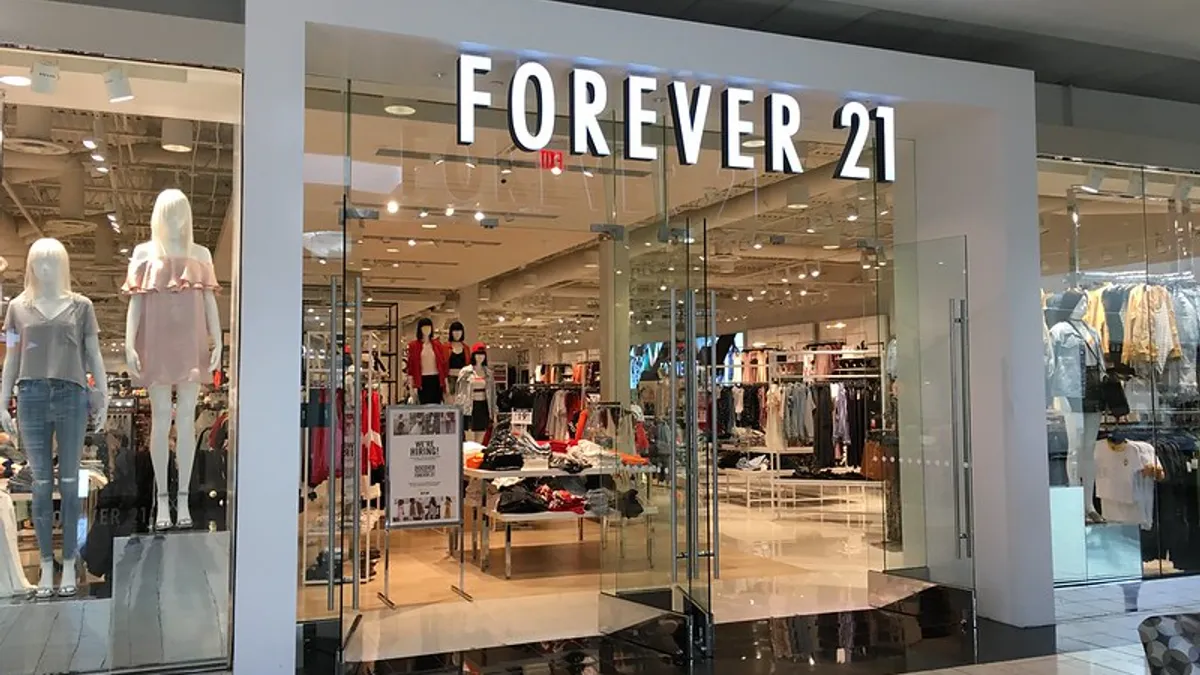Dive Brief:
- Forever 21 said it would suspend an auction for its business scheduled for Monday, as it hasn't received any qualified bids beyond its stalking horse. The retailer previously set a bid deadline of Feb. 7.
- Without an auction, the retailer said it planned to go forward with a hearing scheduled for Feb. 11 to approve its stalking horse bid, an $81 million offer assembled by Authentic Brands group and major Forever 21 landlords Simon Property and Brookfield.
- The retailer said it reserved the right to hold an auction later.
Dive Insight:
The sale of Forever 21 would mark a radical departure for the retailer, having been controlled since the 1980s by its founding family.
While the company reportedly spoke with landlords and other stakeholders about an investment ahead of filing, when Forever 21 entered bankruptcy in September, its stated plan was to reorganize, right its business, and exit as a going concern.
But it didn't have a negotiated plan going into Chapter 11. And the company has continued its financial struggles in bankruptcy. According to its latest operating report, Forever 21's retail unit operated at a $47.2 million loss during the month of December, on revenue of $233 million. Its Riley Rose beauty segment had an operating loss of $1.95 million on revenue of $2 million. Its continued losses could explain why the retailer sought to sell itself rather than try to go it alone out of bankruptcy. Put simply, Forever 21 may have had few other options beyond liquidating.
And why would any prospective buyer take on a fix-up project of that magnitude? For one, Simon and Brookfield have plenty at stake in the retailer. Together, they represent 42% of Forever 21's U.S. locations, according to court papers. The retailer rented nearly 100 domestic stores from Simon specifically, representing almost 1.5 million square feet and 1.4% of Simon's domestic base rent, according to securities filings.
But Simon Properties CEO David Simon pushed back on the notion that the company was taking a stake (nearly 50% in Simon's case) in Forever 21 to protect its rent interests. "[T]hat's the biggest misnomer out there when I read various publications and analyst notes and media notes," Simon said, according to a Seeking Alpha transcript. "We do it — we make these investments for the sole purpose of we think there's a return on investment."
The mall operator's model for investing in a bankrupt retailer is the sale of Aeropostale to a group that included Simon and General Growth Properties. "Now the fact of the matter is we did all this [with] Aero and the reality is they kept paying us rent," Simon. "So that's like — that's obviously beneficial and I don't want to understate that but that's not why we do it. At the same time with F21, we do think there is a business there, but it's got to be turned around. And I'm not going to project today to you what those numbers are, but we've got our work ahead of us."
Simon declined, when asked by analysts, to get into details of the turnaround plan the buying group had for Forever 21.
The retailer's quick sale to its landlords and the licensing specialist Authentic Brands, which recently took on the Barneys New York intellectual property, comes amid objections by suppliers. Vendors and landlords voiced worries since the bid was announced that they could lose millions of dollars after Forever 21 fell behind on payments, and that the short timeline set for gathering bids and scheduling an option was too short to maximize the company's ultimate sale value.
A previous version of this story misstated how much space Forever 21 leases from Simon Property.















